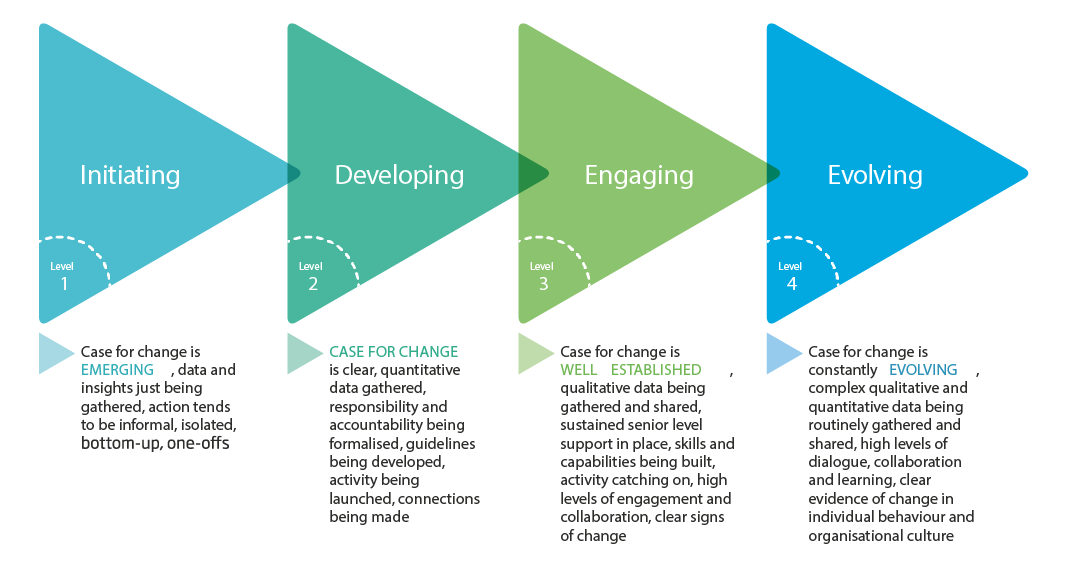
In August 2018, the British Pharmacological Society appointed for business sake consulting to work with the Society to:
- Review the Society’s current activities, processes, decision making and culture in the context of widening participation, equality, diversity and inclusion (EDI)
- Assess the Society’s performance on EDI, benchmarked against the Science Council and Royal Academy of Engineering’s diversity framework and compare our performance to other similar organisations.
- Develop recommendations and guidance on next steps to improve best practice, and help the Society deliver on its strategic commitments on equality, diversity and inclusion.
The project was led by a steering group, the role of which was to discuss and agree the scope, purpose and approach for the organisational assessment. The steering group was appointed to include staff and members with in-depth knowledge of our activities and an external EDI professional. Once documentary evidence, feedback and data had been gathered, the steering group participated in the interpretation and sense‐making of this evidence. The group also provided feedback on the conclusions and recommendations of the draft report.
In December 2018, for business sake consulting presented the interim findings to Council. The final report was delivered to the Society in March 2019. The consultants made extensive recommendations across all business areas. Over the course of June and July 2019, members of BPS staff volunteered to join a staff team to review the recommendations and propose how to take them forwards as part of the 2020 objectives, identifying immediate actions for 2019, items for the 2020 business objectives and longer-term goals as appropriate.
Key findings of the for business sake report
The report found that the Society largely scored as a ‘1’ (out of a high score of 4, on a scale of 1-4) meaning it is at the ‘initiating’ stage for our work on EDI. Most comparable organisations had scored as a “2” on a self-assessment.

Figure 1. Diversity framework scoring levels.
The consultants noted that the Society had commissioned an external assessment, which may have been more stringent than self-assessment. They also noted that they were impressed by the level of enthusiasm and motivation to engage with EDI, from Society leadership to across the staff team. The consultants believe the Society is at threshold for scoring at a level “2” and moving to this level is mostly a case of documenting process and policy and ensuring all staff and members are aware of our expectations. They also noted that whilst there was high energy to engage with EDI because “it is the right thing to do”, the Society would benefit from developing its case for change – both to help set a clear direction for action, and to bring the membership with us.
They recommended approaching this through three, interdependent channels of work: ‘laying the foundations’, ‘taking a stand’ and ‘changing the system’:
-(2).png.aspx?lang=en-GB)
Figure 2. A three-pronged approach for the Society, recommended by for business sake consultants.
EDI staff team report
Volunteers from the staff team worked in small groups to review the report recommendations, identify areas for rapid implementation, and to think about if/how they should be embedded in our work plans. We agreed that the recommendations could be consolidated into eight key objectives, including some immediate actions. We have begun integrating these into our 2020 business objectives and will continue to embed and develop them over the course of our five-year strategy:
Summary: internal Society business objectives on EDI drawn from the ‘for business sake’ report
- To develop & communicate the Society’s 'commitment to change' on equality, diversity and inclusion
- To review our approaches to gathering and reporting EDI data across the Society, making recommendations in line with good practice
- To set expectations and standards for an inclusive culture across the Societies activities
- Ensure all current Society opportunities are visible and communicated to the membership, and specifically to under-represented groups and/or those who need support
- Develop a plan to widen participation in Society activities and pharmacology, including approaches that target under-represented groups
- To develop EDI guidance and support for staff and members that incorporate Society policy/expectations and good practice
- To review our materials, events and communications to assess accessibility and inclusivity, making alterations or recommendations for change where necessary
- Continue to develop our approach to building an inclusive work environment, to ensure all employees are treated equally and fairly and can bring their best selves to work
Key milestones on the path to delivering our current strategy
- January 2018. New Society strategy takes effect, including the objective to “to remove barriers to participation and success, while welcoming equality and celebrating diversity, and being inclusive in all we do”
- August 2018. Society commissions external review of its approach to equality, diversity and inclusion.
- December 2018. The Society becomes a member of EDIS Group, supporting the vision that “everyone should have equal opportunities and access to a successful career within Science or Health, its research and its outcomes”.
- March 2019. Society receives the final report and recommendations arising from the external review.
- June 2019. Society commissions external review to examine whether a gender pay gap exists at any level of our organisation. Key outcomes to be shared with staff, overall the gender pay is balanced with no gaps.
- June/July 2019. Staff volunteer group reviews recommendations of the report, evolving these into recommended actions and 2020 business objectives.
- August 2019. The British Journal of Pharmacology publishes an editorial on ‘sex as an experimental variable’.
- September 2019. Council approves the EDI business objectives and approach recommended by the staff team, and approves an immediate action to move forwards with appointment of an EDI Trustee.
- September 2019. The Society sponsors the EDIS Symposium 2019 on Inclusive Research & Design.
- October 2019. The Society commissions external consultants to deliver all staff EDI training, with the intention of rolling this out for all committees and advisory groups
- December 2019. The former Membership & Awards Committee and Council approves a new prize that recognises contributions to improving EDI in pharmacology/science. The BPS Equality, Diversity and Inclusion Prize, sponsored by AstraZeneca is first awarded to Dr Aidan Seeley in June 2020.
- December 2019. The Society shares participant values at our 2019 annual conference with the aim of reinforcing a positive and inclusive tone. This builds on our member code of conduct which sets out expected behaviours and makes it clear that we do not tolerate bullying, harassment or abuse.
- December 2019. The Society agrees two key business 2020 objectives related to equality, diversity and inclusion:
- “Continue to implement recommendations arising from our 2018 review of the Society's performance on, and ambitions for, equality, diversity and inclusion”
- To develop & communicate the Society’s 'commitment to change' on equality, diversity, and inclusion
- To develop expectations and standards for an inclusive culture across the Society's activities
- To review our approaches to gathering and reporting EDI data across the Society, making recommendations in line with good practice
- Ensure all current Society opportunities related to EDI/widening participation are visible and communicated to the membership, and specifically to under-represented groups and/or those who need support
- “Continue to develop our approach to building an inclusive work environment, ensure all employees are treated equally and fairly, and further demonstrate our commitment to the wellbeing of staff and job applicants”.
- Develop clear communication on part-time and flexible working options for staff and during recruitment processes
- Agree an approach to working (e.g. core hours, remote working) that meets business and individual employee needs and to make recommendations that support a productive and inclusive culture
- Ensure all recruitment emphasises the importance of EDI to the Society, vacancies are widely/appropriately advertised, develop recruitment/interview guidance and ensure that induction processes are consistent
- Make a recommendation on how to track the diversity of candidates through the recruitment process, considering how best to report this
- Produce a managers handbook/guide as a useful resource/tool for all managers including on the consistency of implementation re policies and procedures, considering where internal training may be appropriate
- March 2020. Society appoints Lenna Cumberbatch as EDI Trustee
- April 2020. Building on the participant values shared at Pharmacology 2019, Council approves a code of conduct for all our external meetings. We are currently developing a code of conduct for our committees and groups.
- May 2020. Dr Anna Zecharia, the Society’s Director of Policy & Public Affairs and EDI lead, is elected to the EDIS Development Board in a Strategy Development role.
- September 2020. The Society publishes an open call for submissions to improve our understanding of work that our members and the pharmacology community are doing on equality, diversity and inclusion.
- October 2020. Society joins the Royal College of Physicians and almost 80 other organisations as a founder member of the Inequalities in Health Alliance. Read our news story.
How can you get involved?
We want to make change. As part of this, and our work going forwards, we have opened a call for submissions to hear about what you are already doing in this area, and to explore how we may be able to work together. Please send a short summary of your work on equality, diversity and inclusion to Sophia McCully (Policy Officer) as soon as possible, indicating whether you would be interested in discussing this at our annual meeting .
If you feel that there is anything else we should be thinking about or focusing on, please also get in touch.
To discuss this work, please contact Anna Zecharia via email or through the BPS Community.
Further reading